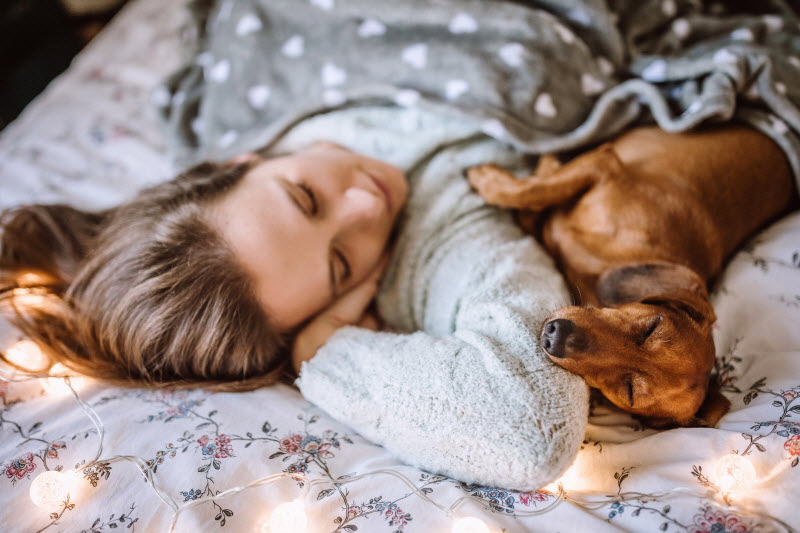The winter holiday season is a magical time filled with festive decorations, delicious treats and joyful gatherings. It’s also, for many, a period filled with stress, anxiety and an endless to-do list. For most, it’s a little bit of both.
However, amid the hustle and bustle of holiday preparations, it’s crucial not to neglect one of the most essential aspects of well-being—quality sleep. The change in temperature, schedules and daylight hours can disrupt your sleep patterns – just when you really need a good night’s rest. One study found that almost half the people surveyed reported not sleeping well during the holiday season.
Getting enough sleep is important year-round, but it’s especially important during the winter holiday season because it helps ward off sickness, reduces stress and boosts your energy levels. Not getting enough sleep has the opposite outcome. Additionally, operating on little sleep can increase your cravings for sugary, rich foods, which are all too available during the holidays.
Fortunately, you can achieve a restful and rejuvenating night of slumber with a few mindful adjustments and efforts.
Holiday Sleep Tips
Watch your diet
One of the most challenging and important things to do is to stick to a healthy diet and do your best to resist overindulging in rich holiday meals or sugary treats. For one, eating a large meal can make you feel sluggish and low-energy. Eating a large meal before bed can make it challenging to sleep while your body is digesting.
Then, surgery-packed goodies can wreak havoc on your moods and energy levels, especially if nibbled on an empty stomach. Eating small meals of fiber-rich, unprocessed, whole foods throughout the day can help keep your energy up and your cravings down. Try to finish your evening meal about two hours before bedtime to reduce bouts of indigestion and acid reflux.
Exercise where and when you can
Exercise goes hand in hand with a healthy diet to reduce stress and weight gain and help you fall asleep more easily at night. With a hectic schedule and fewer daylight hours, though, it may be challenging to find time to hit the gym and get outside for some cardiovascular activity.
But don’t give up your exercise routine entirely! If you can’t make it to your favorite yoga or exercise class, try stretching, walking around the block or climbing up and down your stairs 10 minutes at a time, taking breaks from cooking or wrapping. Every little bit of movement helps.
Reduce stress
If you don’t feel stressed during the holidays, you are in the minority! One study found that 62% of those surveyed said their stress level was very or somewhat elevated during the holidays, and only 10% said they didn’t experience holiday stress.
Unfortunately, stress can interfere with sleep, and not getting enough sleep can elevate stress levels, so managing both issues during the holidays is crucial. To reduce stress, try to take some time for yourself every day, whether walking in the park, playing with your dog, or watching a mindless TV show. Another effective way to reduce the stress of the holiday season is to plan as much as possible in advance, including gifts, meals and travel. And, lastly, good old relaxation techniques like deep breathing, yoga and meditation usually do the trick.
Create a sleep-friendly bedroom
While eating a healthy diet, exercising daily, and reducing stress may be challenging at times, creating a sleep-friendly room should not take much effort at all, once you set it up. First, make sure your room is dark. Light interferes with melatonin production, the sleep hormone. It’s also vital to reduce exposure to light, especially blue light from an electronic device, before bed. About an hour before you hit the sack, power your phone down or put it in a room far from your bedroom.
Then, turn the temperature down. The ideal sleeping temperature is between 60 and 67 degrees. Is that too chilly for you? Make sure your comforter is thick or thin enough to keep you comfortable. And lastly, shut out noise. A quiet, dark, cool room is the optimal environment for a good night’s sleep.
Drink in moderation
Alcohol can indeed have a calming effect and even help you fall asleep soundly – at first. But, overall, alcohol, even in low or moderate amounts, can disrupt your sleep, usually in the middle of the night, and affect your sleep quality. According to the Sleep Foundation, even just one drink can decrease sleep quality by 24% for women.
Alcohol acts as a depressant on the brain and can induce sleep. But, eventually, alcohol is metabolized into a stimulant that can wake you in the second half of the night, often interfering with the important REM or deep sleep cycles.
If you want to indulge in a drink during the holidays, having that drink at least two hours before bedtime will reduce your chances of middle of the night wakefulness.
While sleep disturbances seem almost inevitable during the holiday season, trying to stick to a healthy diet, exercise regularly, plan ahead and drink in moderation can go a long way in helping you sleep better this time of year.

